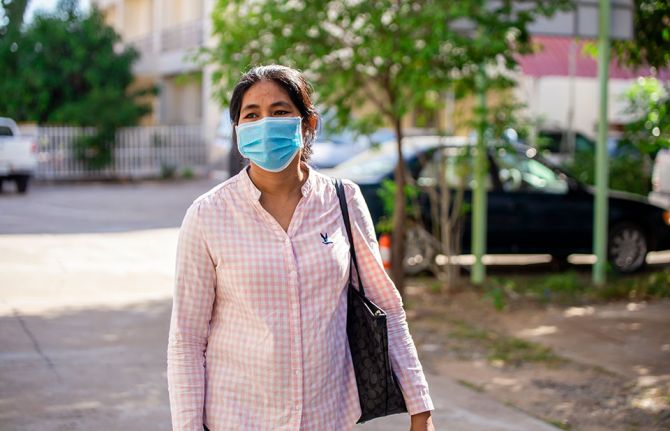

Feature Story
COVID-19 spurs on multimonth dispensing of HIV treatment in Cambodia
25 February 2021
25 February 2021 25 February 2021When the COVID-19 pandemic broke out in Phnom Penh, Em Ra, pictured above, was worried.
She lives with HIV and she only had supplies of medicine to last a month.
“First, I was afraid that the medicine could not be shipped to Cambodia, the second is that when we don’t have medicine for a few months we have to come to the clinic often,” she said. “This increases my expenses but also raises my chances of getting COVID-19.”
During a recent visit to the National Center for HIV/AIDS, Dermatology and STDs (NCHADS) clinic, her doctor, Prak Narom, informed her that she would qualify for multimonth dispensing of HIV treatment. “Because of COVID-19, a patient in good health who takes their treatment daily can be prescribed HIV medicine for more than three months, and for some patients we can give them up to six months,” he explained.
Ms Ra is one of thousands in Cambodia who can now pick up a stock of medicine in one visit. There are an estimated 73 000 people living with HIV in Cambodia and now nearly 50% of people on treatment have access to multimonth dispensing of HIV treatment. Before the pandemic, that number stood at 34%.
The multimonth dispensing of HIV treatment programme in Cambodia began in 2019, long before the COVID-19 pandemic, but it has proven to be a godsend.
“When we started multimonth dispensing, there were some challenges because we had a shortage of drugs, but today we have overcome that so we can give medicine to people for up to six months,” said Ly Penh Sun, Director of NCHADS, pictured above.
The UNAIDS Country Director for Cambodia, Vladanka Andreeva, had feared the worse when COVID-19 shut down the country. “The biggest and oldest HIV treatment site in the capital was repurposed to serve as a COVID-19 centre and our outreach activities had to cease with public venues closed to the public.”
But UNAIDS, with the national AIDS programme and communities, worked together and helped with moving people to another treatment site, while providing face coverings and hand sanitizer to people living with HIV. UNAIDS also advocated that people living with HIV be integrated in the emergency cash transfer programme. As a result, more than 2500 households benefitted.
And more importantly, UNAIDS and partners pushed to introduce the home delivery of treatment and the rollout of multimonth dispensing of HIV medicine at the national level.
“We have used COVID-19 as an accelerator to further scale up and promote the multimonth dispensing of medicine,” Ms Andreeva said, pictured above.
It has been so successful that Mr Narom can’t believe it.
“In the past we used to see 30 patients in the morning, but now with multimonth dispensing we can reduce that by half or more than half,” he said. “I can now spend more time with my patients and carry out more in-depth check-ups.”
When a person is unable to take antiretroviral therapy regularly, their viral load increases, impacting the person’s health, which can ultimately lead to death. Even relatively short-term interruptions to HIV treatment can have a significant negative impact on a person’s health and potential to transmit HIV.
UNAIDS is advocating that all countries, ministries of health and national AIDS programmes grant access to three months or more of antiretroviral therapy for all people living with HIV, including refugees and migrants.
As for Ms Ra, she has joined a Telegram group started by the clinic for people living with HIV in case they have questions about their health or their medicine.
Watch: COVID-19 spurs on multimonth dispensing of HIV treatment in Cambodia
Photo credit: UNAIDS/S.Dara



